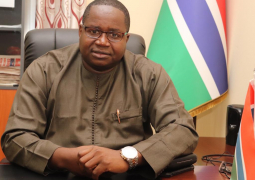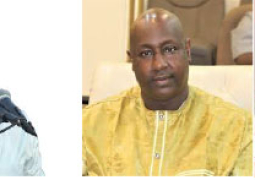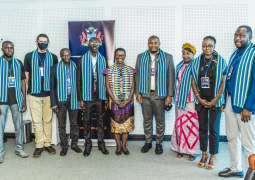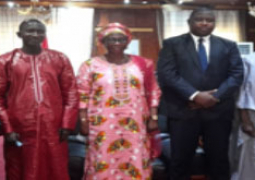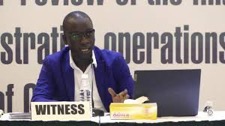
Jonga had appeared a number of times before the Commission.
The session’s beginning was marked by him producing certain documents: the budget for 2020, which was approved by the Ministry of Local Government through a letter dated 18 March 2020; an endorsement letter by the Ministry dated 14 May 2021 for the 2021 budget; approval letter for the 2022 budget by the Ministry dated 9 November 2021; the budget for 2023. There was no attachment of the approval for 2023. The documents were admitted into evidence.
Jonga claimed that the 2023 budget was endorsed by the Ministry but provided no evidence to that regard. He was tasked to get the approval from the Ministry.
The Commission first engaged Jonga on the issue of the 2020 budget. Jonga said the estimate for 2020 was D86 million.
For the trade license, he stated that in 2019, they collected D27.8 million and the estimate for 2020 was D35.3 million. He claimed that the projections were informed by the assessment conducted and increase of businesses in the area.
Jonga was, at this juncture, questioned on how assessments were conducted. He testified that the collectors did the assessment and they were able to project the amount. He added that the assessments were compiled in the Council, and they would come up with the projection for the forthcoming year.
Jonga disclosed that after the assessment, the collectors usually transmitted the information to their line managers, who would inform the finance director and then the finance committee.
The former CEO did acknowledge that assessments were not adequately done, but disagreed with Lead Counsel Patrick Gomez that there were no assessments done. He argued that there were assessments.
“Do you have assessment reports for each year?” Lead counsel Patrick Gomez posed.
Jonga held that the answer for the counsel’s question “cannot be a yes or no answer.” But he remained mute after being asked if the document existed.
“Can you provide assessment reports?” Gomez asked, but Jonga replied that he “will ask [for it]”.
Surprisingly enough, the argumentative Mr Jonga pleaded for time to confirm whether there were assessment reports from 2020 to 2023. His request was granted.
At this point, the Commission ushered in Alagie Jeng, the director of finance of BAC. The same questions about assessment were raised. He emphatically stated there were no assessments for 2020, 2021, 2022 and 2023.
Following this admission by the finance director, ex-CEO Modou Jonga took a dramatic turn, saying there were no assessments done in those years mentioned. Counsel Gomez asked why there were no assessments.
Modou Jonga responded: “It is a surprising statement coming from the director of finance. It is expected that before the end of each year, there should be an assessment to have correct projections for the following year.”
“You cannot,” the lead counsel stated, “submit a budget when there is no assessment.”
Counsel Gomez told Jonga that he knew there was no assessment done and should be honest to admit facts that are obvious. Gomez added that he was the CEO and knew what was happening. But Modou Jonga maintained he was not aware of the lack of assessment report until then (during hearing).
However, as put forth by the counsel, he did admit that it was his “to know as an experienced CEO”.
“It means you were not efficient,” Gomez put forth, but Jonga disagreed.
Witness Jonga said it felt terrible realising that they were not dealing with the true figures when preparing their budgets.
Lead counsel Patrick Gomez referred Modou Jonga to section 204 of the Financial and Accounting Manual for Local Government Authorities. The section outlines the roles of the finance director and things the finance director is answerable to, to the CEO. The law clearly provides that the finance director shall prepare the budget in consultation with the CEO.
“Don't give excuses. Your choices of words are diluting the facts,” Gomez addressed, but the witness said he was not making excuses.
Responding to further questions Jonga did testify that he never requested for an assessment to be conducted. He also admitted that he was never given assessment reports and had no assessment reports to guide his decisions.
He agreed with the counsel that “without the assessment, the figures in the budget would not be accurate.
Hearing dragged on and procurement matters came next. Modou Jonga was handed the procurement file for BAC.
Modou Jonga testified that the procurement plans were not approved. It was his testimony that procurement plans are not meant to be approved by the approving authority – the Gambia Public Procurement Authority – but only needed to be informed by the budget.
Evidence at the Commission disclosed that for 2021, the estimated cost of fuel was D6.2 million and the procurement method was to be framework agreement or request for quotation. For stationery in 2021, the estimated cost was D500,000 and the procurement method was to either be requested for quotation or framework agreement.
“Was that in line with your budget?” Counsel Gomez asked.
Answering the question as to whether that was in line with the budget, Jonga stated that the plan was in line with the budget. On how much was spent on fuel and stationery in 2021, Jonga said it was D4.6 million.
He reiterated that the estimated revenue for 2020 was D86 million. Lead Counsel Patrick Gomez referred him to the audit report by the National Audit Office for the year 2020. The auditors indicated that the payment for fuel was D9,145,401.
The lead counsel noted that it was far more than what was in the budget and far more than what was in the procurement plan. Jonga eventually claimed that the amount he earlier mentioned was for January and July 2020.
“How much did you spend in 2020?” Lead Counsel Gomez asked.
Jonga switched on his laptop and mentioned the same amount as contained in the audit report. He stated that the estimate and the procurement plan indicated D6.2 million.
He was quizzed over the amount spent for stationery in 2020 and he said D2 million.
He said he had no delivery notes for all. He admitted that in the absence of the delivery notes it would be difficult to ascertain if the funds were spent on the stationery. He was again asked if they had expenditure statements as required by the Financial Manual, but he stated they had none.
Evidence disclosed that D615,000 was spent on transport refunds. The witness was asked about the vouchers but said he would check from the Council.
The Commission also learnt that D2,977,270 was spent on ‘Setsettal’ (cleansing). Jonga said it was for clearing illegal dumpsites. The Commission requested for the corresponding vouchers.
Again, over D3.3 million was spent on hiring vehicles, D9.8 million as loan repayment and the total expenditure for 2020 was 38.5 million. The Commission requested for all the corresponding vouchers.
Chairperson Jainaba Bah observed that there was no amount put for the honorarium column. She informed the witness that the honorarium was paid, but there was no figure in the budget. Jonga agreed and requested for time to find out.
Moving to the 2021 budget, which was briefly discussed earlier, it was realised that the budget for fuel was D6.2 million and the amount spent was over D10.9 million, indicating an excess of D4.7 million.
Jonga was mute after being asked what authority he had to make such purchases. He agreed with the counsel that all these purchases were unlawful. The Commission highlighted that D717,628.50 was spent on stationery. Jonga said there were no delivery notes to support the expenditure. He was requested to bring all vouchers and supporting documents for the expenses incurred in 2021.


